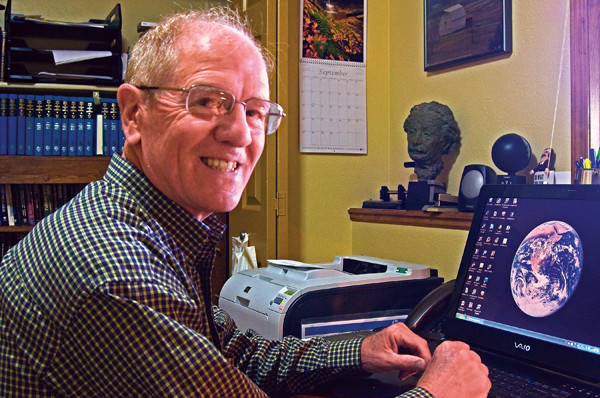
by George A. Seielstad Friday, December 28, 2012

George Seielstad
How did we leverage our intellect so that humans have become a basic force of nature, modifying the world to meet our needs, and thus spawning a new geologic epoch, the Anthropocene? What will the Anthropocene’s legacy be — both in terms of humanity and of Earth?
Ultimately, the answer can be reduced to self-centeredness. All organisms are fundamentally self-centered — they seek advantage to thrive. Humans’ best gift, our blazing intellect, allows us to step beyond this basic struggle to consider broader implications. When we ignore this gift, our blind self-centeredness works against us, our children and our grandchildren.
A tenet of our modern culture is to acquire more and more, faster and faster. In the process, we disregard the health of ecosystems and the services they provide, and thus ignore the long-term risks our extraction of nonrenewable resources and generation of waste pose to our progeny. Our unquenchable thirst for more is explained by our self-centeredness: By living in the present with little thought about consequences in the future, we are borrowing from our descendants instead of being the ancestors they will wish we had been.
We are capable of a grander vision, so is there something so special about this time during which we live that justifies this focus on our immediate well-being?
One way to answer this is to note what Copernicus did to “our” place in the universe. By suggesting that the sun, not Earth, is at the center of our solar system, he eliminated our “special” location in space. That Earth does not occupy a “special” place is a logical conclusion: By definition, most places are not special.
Maybe we can use such Copernican thinking to likewise eliminate the idea that we occupy a special moment in time. Princeton University astrophysicist J. Richard Gott III did just that. He realized that non-special time periods vastly outnumber special ones. For example, he noted, our birth dates are a consequence of happenstance, not of design. Accordingly there is a 95 percent chance that you were born after the first nine days of the year (which corresponds to 2.5 percent of the year) but before the last nine days: that is, between Jan. 10 and Dec. 21. If only the first 2.5 percent of a time interval has expired (like the first nine days of a year), then 39 times as much time remains in that interval (356 days). The reverse is obviously also true: If 97.5 percent of a time period has elapsed, 1/39 of that interval remains. So, for an event that could occur at an arbitrary moment between a beginning and an ending, there is a 95 percent chance it will last at least 1/39 as long as, and at most 39 times longer than it has already existed.
So let’s apply this logic to us. The ancestry of Homo sapiens dates back about 200,000 years. Our modern population appeared at an arbitrary time between the origin and the (eventual) demise of our species. So we, H. sapiens, are 95 percent likely to last at least another 5,100 years (assuming 97.5 percent of our species’ time on Earth has already passed) or at most 7.8 million more years (39 times longer than how long we’ve already been around, assuming we’ve only used up 2.5 percent of our time on Earth). Considering that among our predecessors, H. habilis lasted about 0.6 million years, H. erectus 1.3 million years, and H. neanderthalensis 0.4 million years, it appears that Gott’s estimation technique works and that our longevity will be comparable to that of our ancestors — that is to say, brief in geological terms.
Taking this logic further, the era in which humans have been a distinct force of nature is recent in geologic time, and the brevity of our existence gives no assurance of a lengthy future. Modern industrial society is a 300-year phenomenon. Is that enough time for our ingenuity to help us to beat the odds and ensure our own durability, or might this era just fall within the norm, lasting between another eight to 12,000 years? Even if we hit the statistical 97.5 percentile of duration for a modern society, that still encompasses only 0.0003 percent of the time all of life has existed — and only 6 percent of the time humans have been on the planet.
The good news for the planet is that we possess the tools to assess our impacts on Earth and the intelligence to invent mechanisms that avoid the worst of them. But we cannot expect intelligence to grant us immortality. Assuming one’s existence to be special has repeatedly proven to be a mistake; it is wiser to be modern Copernicans, accepting the likelihood of mediocrity rather than the slim chance of superiority.
We know with 95 percent certainty that today is not so special that we are entitled to completely disregard the future; “business as usual” has too short a history to commit automatically to its perpetuation; and finally, our species may have little time left. To make the most of it, each successive human generation should commit to leaving a better world than the one it inherited.
© 2008-2021. All rights reserved. Any copying, redistribution or retransmission of any of the contents of this service without the expressed written permission of the American Geosciences Institute is expressly prohibited. Click here for all copyright requests.